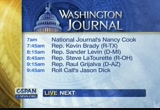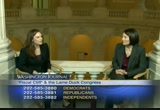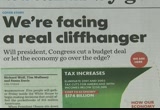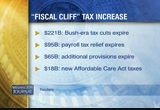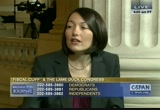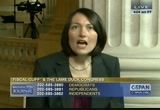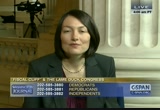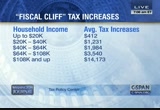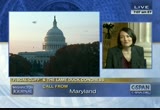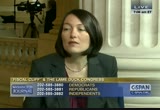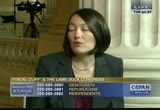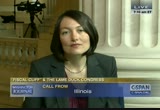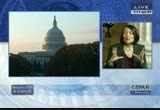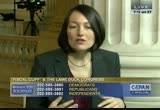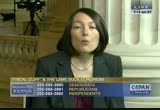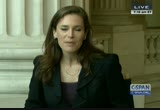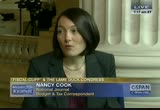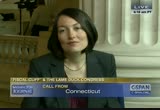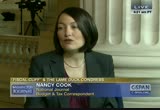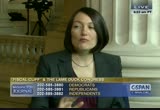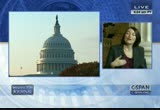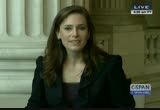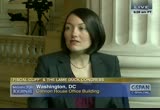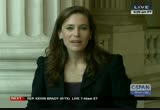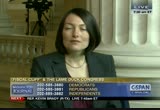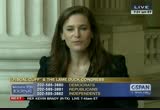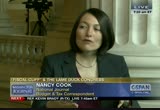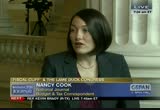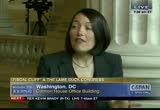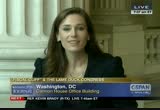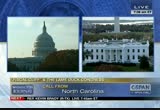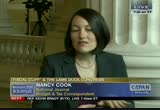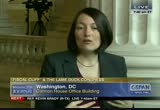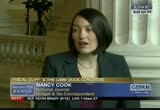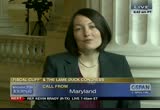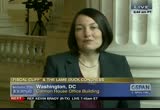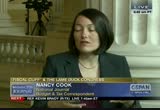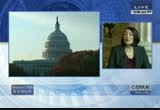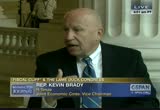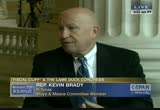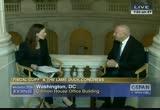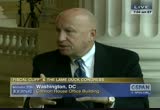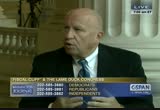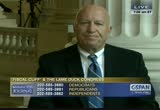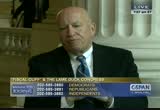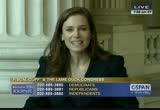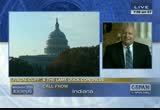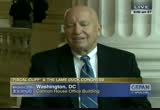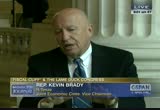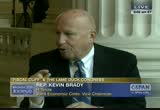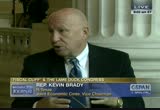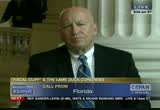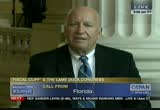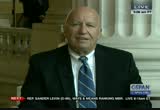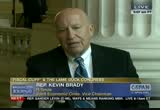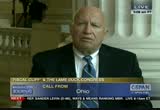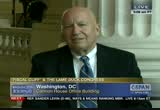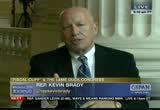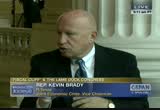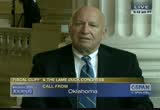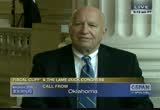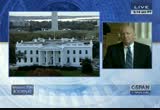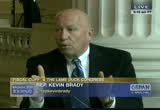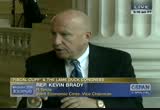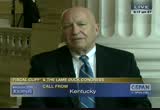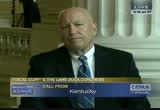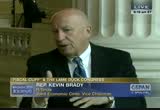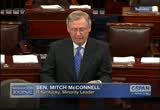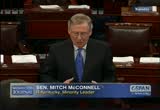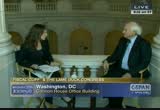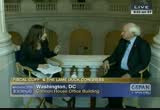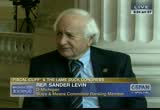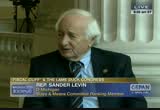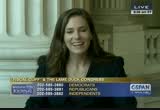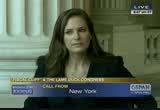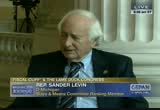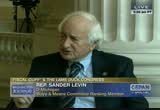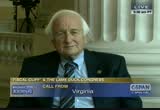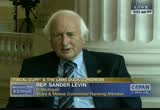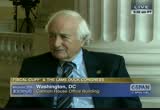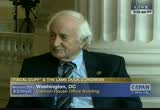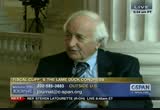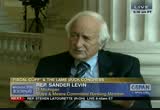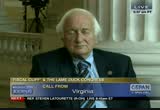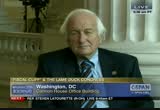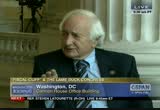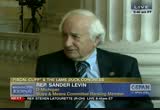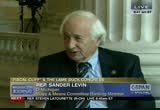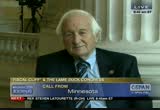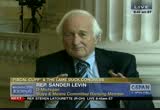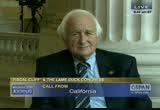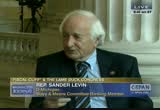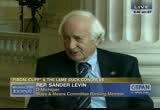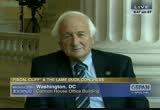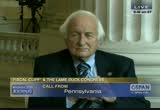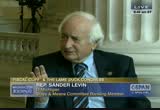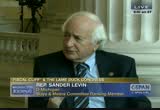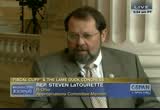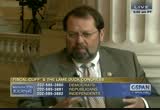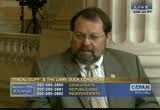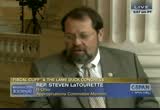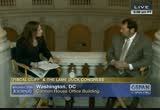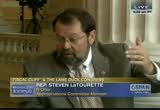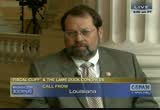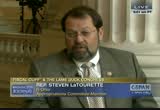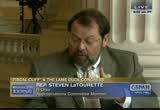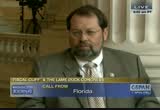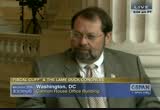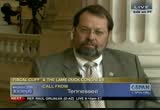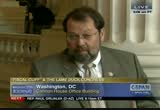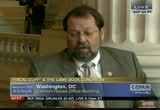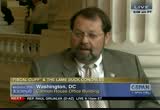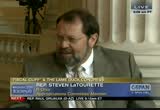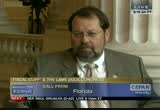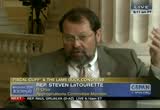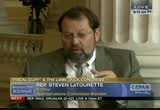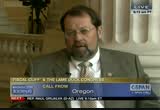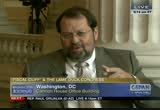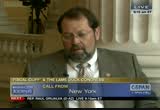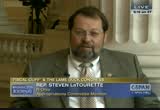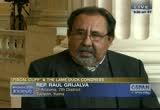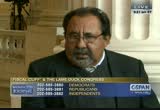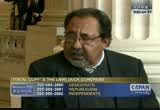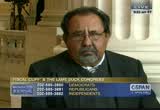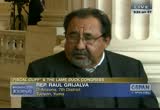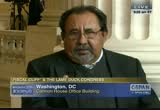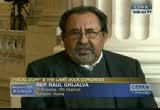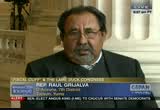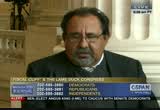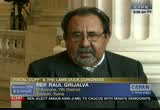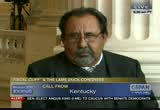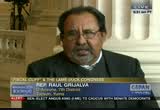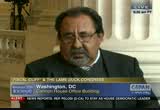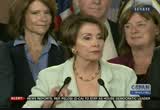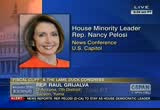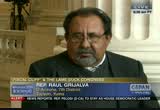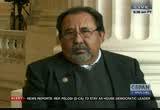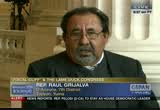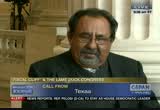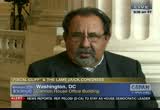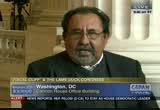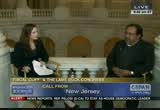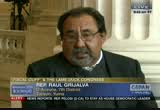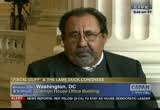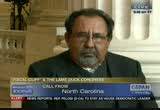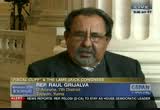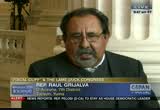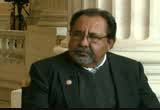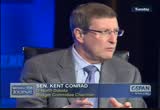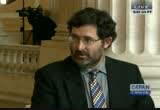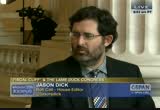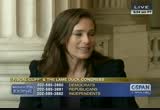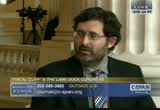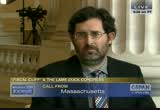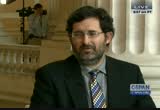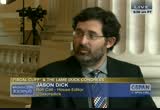tv Washington Journal CSPAN November 14, 2012 7:00am-10:00am EST
7:00 am
read, member of the appropriations committee, democratic representative raul rijalva ♪ host: the morning and welcome to washington journal. the house and senate are back in washington and we are live from capitol hill. the lame duck session kicks off this week in the so-called fiscal cliff is the main issue facing congress. we would like to get your thoughts. you are the numbers to call democrats -- 202-585-3880. republicans -- 202-585-3881. independence -- 202-585-3882.
7:01 am
joining us to talk, the lame- duck congress and the fiscal cliff is nancy cliff, from the national journal. thank you for being here. what is at stake during a lame- duck session? guest: the biggest hunk of things at stake are tax changes. those are individual tax rates, tax breaks for businesses at stake. the alternative minimum tax that could hit more middle income families. and then these mandated spending cuts that the budget control act put in place, those are called the sequester. those would have the federal government spending across a bunch of different things like health care spending, biomedical research, education. and the other half of that would hit defense. host: the rest of the world is waking up to it. the front page of usa today says -- we are facing a real cliff
7:02 am
hanger. take a store with the fiscal cliff is. guest: it is all these different things, a lot of consumers face. one thing i thought was right about that usa today story is that it lays out how it will affect consumers. and about 90% of all americans could face potential increases in their tax bills. that could be everything from the payroll tax holiday expiring and seeing as paychecks go up. to seeing your individual tax in it, rate go up. and so these are a lot of different things that affect people's pocketbooks. and this is a big deal. especially to happen right after the election. >host: your reporting is as 90 percent of americans could be affected. guest: it would affect a lot of people a lot of different ways. people in the upper income brackets would face the largest
7:03 am
amount of tax increases. because they pay the most income taxes. but everyone would see their payroll tax go up, other individual income tax, taxes on investment in, are at stake. and for corporations and businesses, they are concerned because there are a lot of business tax breaks that affect the way they do business, the way they think about spending money. host: how much has to be tackled before this congress adjourns for the new year? we will see the 113th congress come in. what did have to tackle before we hit the new year? guest: it depends. that is a great question. everyone wants to know. one thing and will have to tackle is the alternative minimum tax. a tax cut was created several years ago in the late 1960's. was originally meant as a tax on wealthy people. you know, every year they have to do this patch to fix it because over time have never
7:04 am
really done a full-scale overhaul. and what happens every year come if you do not do that, it ends up hitting middle in the, families. and no politician republican or democrat wants to be responsible for having suddenly millions of people, middle-class people hit by this tax. that is one thing that has got to happen. the business committee would love for their tax breaks to go forth and get extended. but i think the alternative minimum tax is one of the few things that absolutely has got to get don. and some of the other things and the individual income tax breaks, there's a question about whether those can be retroactively dealt with it goes past the new year. i cannot think most politicians necessarily want to put off. nw when they want some sort of small deal put together a list of the end of the year so that they know going into 2013 what they are going to be tackling. host: could they come up with a short-term affairs, getting us for the next few weeks, and then the hard work later in the new
7:05 am
year? is that a realistic possibility? guest: i think that is the most likely scenario. very few politicians want to do with a call going over the cliff which means they cannot deal with anything and the spending cuts take place in people's tax rates go up. politically that does not make them look great. what is most likely is it we will see a short-term deal where they say, we are not born to let these mandated spending cuts take effect. we are going to extend some of the tax breaks. there will come up with some sort of framework that says, this is how we are going to deal with this in 2013. host: nancy cliff would be national journal. let us get to the phones. roy. where are you calling from? caller: i am calling from kentucky. thank you. i have a couple things to say. during his administration, there are a couple factories of the shutdown and a couple people
7:06 am
that i work at a restaurant, five have been laid off because of taxes. i do not know how tax is going to be. is it going to be on their checks every two weeks or every week? our taxes going to be for individuals? that work out here in this country? is it going to shut more jobs down? as a point create more jobs? you know, the wealthy are going to get taxed, but what about other people? individuals that work every day? i just think that if we are going to keep getting higher taxes, more jobs are going to be lost, and it just is terrible. host: he is asking about the bottom line, what it really means what people get their paychecks. guest: the most immediate thing people would see is that if congress does not extend the payroll tax holiday -- in a
7:07 am
summit people saw their paychecks, it was a slight decrease in the payroll taxes but were taken out of their paychecks. that a sum it would immediately take the fact that people would say. for the average family that is about $20 every two weeks. host: let us go to david in maryland. hello. caller: good morning. my question is, what might the failure to address this impact our bond ratings, as well as the idea that the united states stands for an international currency -- bay oil market. the oil market. it could be tempting for others to want something more favorable. the euro is not anywhere near as well as the united states dollar. that may not change for a
7:08 am
while. the second question is, had the united states decided as a major stock harder to put that into receivership and appoint the surrogate, someone to run it, might that not have a proven impossible any means of drawing business in that area back united states? thank you very much geared i will take my answer off air. guest: there a couple different questions in their pure and one is the question of, for the financial markets broadly viewing the fiscal cliff? i think that is a great question. there's a lot of concern that if congress does not come to an agreement of some kind and reassure the market, the congressional budget office has said that the united states can go into a recession if nothing gets addressed and they go off in this clip. and so i think economists are very concerned about that. because no one wants us to go back into a recession and have economic growth slowed that much
7:09 am
here at the wall street and the business community is really watching this and putting a lot of pressure on congress to come to some sort of deal. the business roundtable, a big lobbying group here, have said we need some sense of certainty. we would like you to do corporate tax reform next year, but more immediately, was that something done. so i think there is pressure there, quite a lot from these outside groups. host: is the white house feeling that as much as congress? or more? president obama to the meeting yesterday with progressive leaders, business leaders. was feeling the pressure? guest: at in the white house is certainly feeling the pressure. i think they have the sense that they have leverage from a selection and have this mandate. they do want to raise taxes on the wealthy which is something not they based the campaign on. they reaffirmed that yesterday. but he does want to raise the top tax rates. think they are in a spot for the want to pay attention to what is happening with the economy.
7:10 am
and make sure we do not go back into a recession. but they do want to stick to their guns. they feel like they are really won the election and not to cave in to the republicans on the upper income tax rate. host: chicago, ill., let us go matt, hi. caller: my comment is this, in order for us to solve this problem, both sides are going to have to experience a pretty significant amount of political pain. from my side, i am a lot of the center, i would like to see texas go up on the wealthy. but at the same time, being from chicago i remember when the simpson balls report came out, and congresswoman should kautsky, she said this is horrible there's no way i will vote for this. and i did not think that was
7:11 am
right either. clearly, we are going to have to do something about medicare. i am not in favor of the ryan plan. my overall point is, and unfortunately we have not seen this in the past few years, steve is coming more from the right than from my side, but the overall bank is that both sides are born to half to be willing to take on a significant amount of pain. i hope the willingness is there in order to make the grand bargain as they say. a great show, thank you very much host: thank you. guest: adding the caller makes a great point. for there to be a compromise, with the want to say is they want to see them change the entitlement programs. these are medicare, medicaid, potentially social security, although there's less clamoring to change that. want to see those programs changed so they are not just these open-ended things were the
7:12 am
costs go up. went to see them reforms. so that does not keep adding to the deficit and increasing the federal budget. but the democrats want to see more revenue. want to see higher tax rates, they want republicans to agree to that. for this to be this big grand deal, both sides will have to come to an agreement. host: nancy has a recent story with this headline. someone has got to blank. who has got to blank? guest: that is what we will have to see. what does happen is that the election was just last week. members just came back yesterday. they are just back in washington. there are leadership elections this week. freshman orientation, people are getting their bearings. what we are seeing this week as a lot of political posturing, a lot of talk about or the tea party stands -- were the two
7:13 am
party's stand. there is some signaling about the outlines of a compromise and what that could look like, president obama is meeting with congressional leaders on friday. that will declare direction about where it is headed, i do not think there will be any real movement on a compromise or a set of a deal that will lead got until after the thanksgiving break. right now are there's a lot of behind closed door conversations between a high level congressional staffers and the white house. caller: next caller is al on our line for independents. caller: good morning. i was wondering if you address the issue of the legislative which a deal would be struck. authorization bill, no appropriation bill is actually marks up that budget.
7:14 am
yet the discretionary portion as you well know does have a standard authorization process. and this whole thing to me is the same old thing of a non- decision. what would be the vehicle? the legislative vehicle for such a quick version beyond the cliff? guest: that is a wonderful question. the sequester for those under just tuning into the fiscal cliff is -- these mandated spending cuts. and a hitt two sides of federal spending. they hit the military and they hit non-discretionary spending. education, health research, all of these.
7:15 am
and so, there's wide agreement from both parties that they do not want these mandated across- the-board spending cuts to take place on generate 2. -- on january 2. they said the sequester will not happen. everyone agrees it is bad policy. what will it look like to unravel it? what seems most likely at this point is some sort of deal as part of this short-term deal at the end of the year that will say, we are not granted let these 109 billion dollars in cuts take effect next year, we are going to find some savings around the edges, $55 billion or so, and that will be a down payment which some congressional staffers are calling it and that will unravel the sequester and then we will deal with bigger cuts in the new year. host: president obama made that
7:16 am
declaration that one of the presidential debates, off we will not go forward with the sequester. guest: about was a big deal. we have heard from the head of the office of management. the acting director, he had been on the hill this fall testifying before some committees. he said we do not want the sequester to happen, it is bad policy. but it is up to congress to undo it. there have been many signals that people did not want it to happen. republicans did not want it to happen. many republicans are really worried about the cuts to national security, like senator john mccain and senator lindsey graham. however, will not necessarily heard about point the president say -- no way is this going to happen. was for indication that it is one area where, although there's a lot of gridlock here, both parties to agree on this one point, that this should not happen. host: next caller, bob on our
7:17 am
line for republicans, new jersey. caller: i have two comments. one is, in this a good idea to go over the fiscal cliff. and i am wondering if the tax cuts expire, does that mean that the 47% better not paying taxes will start paying taxes? if that is the case, let us go for it. it is time people get into the game, even if it is $5 a year. something. i will take your comments off air. host: my question was going to become a what does it mean for him? that goes to the question of how much could this mean not just for everyone, but how much it means on a personal level. we will ask other callers there. what to do think about his proposal that we drive off the cliff? caller: i think for a while it seems like that now have been more of a possibility. ifs nancy pelosi yesterday said
7:18 am
that she absolutely does not want that to happen. and she still thinks that is a possibility. i do not think either party -- there just a beginning of this posturing and negotiations, i do not think either party wants to say, we are going to drive. fiscal cliff. they are in in this happy mood of trying to compromise. polling has shown recently that americans are not super confident that congress will actually be able to cut a deal. hear from betty,s a democratic caller. caller: thank you for taking my call. it is tedious for me, because you cannot trust it. for validity or facts.
7:19 am
not only that, but even the news, over and over, there is response about kick the cannot. this is been going on for 12, 14, 24 months. kicking the can, yada yada. and i heard one thing, and that is, the president got some leverage. when he said -- i just stopped. the cuts. this is the leverage that could bring everybody together. stop the tax cuts. i do not want to think about them as an increase. just stop the cut in an environment where it is absolutely essential. i had no children. maybe i will not feel it did not much. but like the last caller said i am ready to pay my their share. and the thing is that fairness is not guaranteed. but this is where i put my emphasis, what is democracy?
7:20 am
we have got to try to work and create fairness. a graduated income tax is the best way to pay according to the ability to pay. the more you give, the more you pay. what is complicated? guest: the caller brings up a great point. this idea of tax fairness. who should pay more? another caller brought up before. what this caller is scion is that something that the president echoed again and again on the campaign trail. and he feels like this as part of the government moving forward. part of the tax fairness issue is at the wealthy should pay more to help pay down the deficit. the other caller was saying he feels like more people should pay federal income taxes to pay down the federal it deficit. this is sort of the two ways that the parties beer taxes or one way that they do. the fact of the matter is that the deficit is an issue.
7:21 am
and at some point, we are going to up to deal with it through taxes, spending cuts, and assist a matter of the formula. host: is the bush era tax cuts which the caller was referring to which the president has said he is willing to roll back on, the highest earners. but we are looking at the payroll tax relief expiring. there are additional provisions and there are new taxes as well. these are all run together and happening at one moment. guest: it is. the remarkable thing is that basically two-thirds of the fiscal cliff is tax policy. and is to put it into context, people talk about the fiscal cliff like it is this kind of one wet a. and is actually a bunch of different things. but just to think about, there are $400 billion that congress needs to think about for 2013 just related to your tax bill. and the bush era tax cuts are a
7:22 am
huge piece of that. and thinking about what we want to do about that -- just to emphasize a point of compromise, both parties do think that the tax cuts should be extended for household incomes below $250,000. that is 98% of taxpayers. although there's all this posturing that both sides feel like they are far apart, they do agree on what one big point. host: next up is howie and south dakota on our line for independents. caller: my question to nancy is -- in our weaken the economy at this point, if we did a sloppy fiscal cliff, would we kind of go -- if we did go off the fiscal cliff would we hit depression? could we stop without a recession? host: what you think about the
7:23 am
potential of these tax increases that would hit your bottom line? caller: you would get to me and my wife pretty good. in this area that we are in it, we do not have too many people that are above that $250,000 a year -- we would have to reach to get middle class. it would hurt us pretty good. host: howie asking about the implications from the financial implications of what would happen next. guest: the congressional budget office, which is this of this non-partisan group that measures budgetary things and put of reports. but not another report last week we are assessing a divot going over the fiscal cliff and letting all of these tax cuts expire, it would slow economic growth down so much that it would put united states back into recession.
7:24 am
whereas it extended all of the tax cuts and put up the mandated spending cuts, that would create jobs, it would boost economic growth, the only problem is over the long run it would add to the deficit. it is this balancing act. how do deal with the deficit? had you deal with economic conditions? host: are the market's watching this? we saw the united states credit rating take a dip on the congress was at a stalemate over whether or not to raise the debt limit. are we looking at that kind of a scenario again? guest: we are. but perhaps more heightened. ratings agencies have said they are thinking messrs. lee downgrading the credit rating again. -- they are thinking about downgrading the credit rating again. i would say there is even more pressure this time because they deal but was struck in 2011 did not and not producing results that we see.
7:25 am
and here we are again. and i feel like economists and wall street and the markets and investors, they need some sense of certainty moving forward that the deficit is on a sustainable path. it is not something that economists say needs to be dealt with immediately. is not likely to solve the deficit problem on january 1 or that it needs to be sawed in these next six weeks or so. but people want a plan and not that we are just kicking this down the road. host: on our line for republicans, mike. caller: good morning. my question is on the revenue side. we have heard a lot about the taxes and i understand how keeping taxes down stimulates employers to hire more. but i have not heard anything on the revenue side as to the intentions for the use of the additional money. and how those are going to
7:26 am
stimulate jobs. in other words, what to expect the performance to be from this revenue that we are being asked to increase? guest: that is an excellent question your time so glad the caller brought up. president obama has said that he wants, if there are higher tax rates on people, he wants to do two things. parts of it would go towards paying down the deficit, an important thing to get under control. and part would go towards increased spending and investment in the economy and things like infrastructure projects by building bridges, repairing roads. these are ways that they do create jobs. these sorts of large-scale projects inevitably, you do have to hire people. and this would go towards job creation. the republicans believe job creation comes from keeping the tax rates low. and letting people not be restricted by taxes.
7:27 am
host: on our line for democrats, milton. where are you calling from? caller: of bowling green, ky. host: you are on. caller: i love c-span, i live by it i think. but i wonder, here is a new idea on all of this fiscal cliff stuff and everything. and the tax, not increases, that is basically what they are if they do not renew the bush tax cuts, but of those tax cuts were designed for a time when we were coming out of the clinton administration and there was a budget surplus. so the president asked congress to give it back to the people, which is fine. but now, there's a different set of circumstances. or you going to apply the tax cuts that were designed for different time, a different situation and to our situation
7:28 am
today? i just think it is the wrong approach. i just think the congress, we need to make our labor internationally competitive. how we do that? that is the problem. can do all of this infrastructure stuff and do a lot of things domestically. we can reduce our dependence on foreign oil. and on energy and all of those things will help. but the key issue here is how do we make our labor internationally competitive? to do that you have to come up with new ideas, new tax cuts, incentives for industry and things like that. that will take some work from congress. and, you know, i feel like that is what they need to do. and it is the same old project, the same old system, it does not fit for today. is that simple. host: nancy cook. caller: that is a fascinating
7:29 am
point. we have had these bush era tax cuts are almost over a decade now. the tricky thing about the tax code is at once you introduce changes to it, it is really hard to change them back and temporary tax cuts often become more permanent ones, and the caller raises a great point about thinking about, what should the tax code will look like rather than all of these temporary things adding up -- adding both parties are concerned. -- i think both parties are concerned. both parties say there would like to bring down the corporate tax rate to 28%. and the republicans want to do something or it would create a different type of tax system of global a that would affect the way that the companies file their taxes and how much tax they pay based on the global economy. host: independent caller in
7:30 am
utah. hi, pat. caller: i have some very strong opinions. and i am an independent. i have owned a small business for years. i have cut way back. i averaged 10 to 12 hours a night and weigh more during the day. and i will not hire until we get this administration -- they start talking about -- there are ideas i wouldn't mind changing. but going into manufacturing and something else, items but without an early halt this country -- items that would definitely help this country. i have young families that go to veterinary school. they have a lot small businesses that were failing. and they work between the two of
7:31 am
them probably 40, 60 hours individually and duly -- keeping their kids with them while they run their business, and keeping their businesses survive. when you start taking these young businesses that are small corporations and you start taxing them because they get taxed to as individuals, you destroy the economy there and will cause them to either fail or to lay off the people. and when you add on top of that the new social program of health care, and i am going to say, it scares me to death, because we need changes in health care, but doing it that way has made us another big mess that makes social security and medicare look like nothing. and a lot of people in this area are laying off people because they just cannot do it. some businesses are closing out.
7:32 am
host: can we ask a follow up? using the threshold of to under $50,000 is too low? what about $1 million? caller: i think that would be more realistic. but this is the area of people cheered when you are starting a business, people are looking for angels. and i am sure you are aware of what that is. people that help you to finance your business to get you back on the place where you are producing the products you want and going to market. i am sure the items i am thinking about can be in international markets, not just here. but we seem to be going about it wrong. host: let us talk about this with nancy cook. the threshold of $250,000. was looking at million-dollar cap? guest: president obama has really made it clear so far that
7:33 am
the chartered $50,000 threshold is here to stay pure and i think that is one -- has made it clear so far that the $250,000 threshold is here to stay. republicans i spoke to say that is not really the point, the point is that we are a party where we do not want to increase tax rates, be it too watered 50, 1 million. $1 million is more politically palatable. and it is hard to say millionaire's do not need to pay more taxes. it is hard to say that in this climate. that is something we will have to watch. about how they handle that going forward. and if republicans are willing to increase tax rates on the highest in the common people. the only problem with moving the threshold from the perspective of the obama administration is that really reduces the amount of revenue that you are born to collect to pay down the deficit.
7:34 am
makes the argument less meaningful because you do sacrifice a chunk of money. and you have to find the money elsewhere. host: water other sticking points as we talk about the fiscal cliff -- what are the other sticking points as we talk about the fiscal cliff? guest: the things that people agree on, we need to deal with the deficit. and that we would like to do corporate tax reform next year. the task to be extended for household income below $250,000. everything else is a sticking point. neither of these big questions about what can a government which should have, do we want a government that provides medicare and medicaid for everyone that needs it. how do we want to pay for that? had we want to tax people? what is the best way to stimulate the economy? there are all of these ideas floating around.
7:35 am
many were litigated during the presidential campaign. they cannot quite a bit during the debate. we heard a lot of taxes. but they approached them so differently. and congress is so very divided at this point that it will be interesting to see how they will work on those divisions in the next month or so and if they can come up with some sort of agreement. host: let us hear from and republican in west virginia. hello. caller: thank you for taking my call. i think she just raised several great questions. i think those are the questions that our leaders in washington should be having in this national conversation about what type of government do we want to have? specifically, do we want to have the federal government to have conversations that are so petty and nit picky that we are going to say 250,000, $1 million, $2 million, it is not the job of the federal government to be
7:36 am
involved in this. and it is not the job of the federal government constitutionally speaking to determine what is fair. that idea of fairness is nebulous and ever-changing based on political convenience of the day. it is the job of the federal government to provide for the common defense and promote the general welfare as the constitution says. and when we get into this idea of, we are going to raise taxes on the rich because the rich have to pay their fair share, raising taxes on the rich does absolutely nothing. regarding the national debt. host: led a squeeze the numbers. he says it will not have much effect. where can the big money come from? guest: there are a couple different ways you can do it. the tax side, you can increase revenue and get more revenue
7:37 am
from people. that can compare individual tax rates, after taxes on investment in,, taxes on the state. they can get rid of the parallel talks holiday. there are more ways to get the revenue than just in, rates. , on the other side is the amount of money that the federal government spends. that is one way to deal with it. things like medicare, medicaid, the cuts. a federal spending for agencies. the question is, republicans won most of the money to come from federal spending. democrats won some of the money to come from revenue with some spending cuts. this is like, what is the cocktail there? you want to do of spending, all revenue, a mix? that is the question we are
7:38 am
debating. host: charles, on our line for democrats, north carolina. caller: they say raising taxes on the rich will not benefit. but it will. integrated 23 million jobs. -- it created 23 million jobs. now, if we keep the tax cuts on the wealthy, that is when to cost us even more money. and this thing about the debt, that is a long-term thing. that is not a big issue. you know the fiscal cliff, you still have time to negotiate to
7:39 am
lower the deal. the american people have spoken. host: thank you. nancy cook, does the president have a mandate to move us forward? guest: yes. i think he has america on his side. i think the administration thinks america is on his side. i think there is a sense that the democrats managed to maintain control of the senate pedometer democrats won at the white house. i think there's a feeling among democrats that they wanted these things, they should be able to put these things into place that they campaigned on which is largely taxing the rich. the house republicans feel like they also have a mandate, they kept their power, they kept the house and proposed something much different. and so the tricky thing is, everyone feels like to have a
7:40 am
mandate moving forward. we will have to wait and see who ends up a bending and who does not. host: anything else you want to respond to? guest: i think one of the other interesting debates happening now is how important is it to deal with the deficit now obverses later. the caller really raised about and said, the debt is important. and that is one thing that the democrats think. even if there is a deficit deal and it is based on this perceived mandate of the obama administration believes it has, i feel like they really want to do a debt deal where there is not a lot of austerity or painful cuts now, it is more a long-term thing. and in the short term and to focus on job creation. republicans like the debt is a huge issue that is dragging down the markets. financial markets are very worried about wall street -- financial markets are worried, wall street is worried.
7:41 am
the question, it is unclear what any of these things would do to the economy. and we are looking at europe and as austerity cuts. what lessons can we derive from that? host: sanda, on our line for independents, good morning. caller: what happened to the 300,000 or 3 million jobs better out there that have not been built? that factories have openings for. and alcoa, and in another factory. why haven't we focused on those factories? and put in some training? the people that own the factories to not want them. we need to do that. the jobs can be filled. people are not dumb. they can do it. and the job is just -- they are out there and the people are
7:42 am
waiting. host: what is the missing component? training? finding the right people? caller: training. the people are smart, but they need to be trained, and they are not willing to put up the money to train them. what can we do? i do not know. is there any talk about revenue spending, creating job programs. when president obama came into office, the stimulus was part of his agenda. as you look at the financial situation, is there talk of big spending right now? guest: there is talk of job training and infrastructure -- from this increased revenue. is that something congress can agree on? i think that in this climate of austerity, as people are starting to think about the deficit, i do not think we will
7:43 am
necessarily see a large-scale stimulus like the one we have before. there is a fascinating statistic and a national journal story that they now spend $7 on programs for senior citizens and elderly people for every $1 it spends on young people. and at $1 goes to everything from education, student loans, job training. so the federal government spending at this point is really skewed towards taking care of the older population of versus helping the younger ones succeed. that'll be a tricky thing moving forward. alternately, to take care of older people you need to of younger people have a good jobs and making good wages. host: tom, maryland, on our line for democrats. caller: i am in annapolis. host: go ahead. caller: i am 77.
7:44 am
medicare has been a good program for me. i would like to see some young people get some jobs. it incurred some of these companies to offer early outs of their older workers -- they can get the young guys hired. my main issue here is inflation. had we stop this inflation which is destroying the government, destroying our dollar? gasoline is incredibly costly. and real-estate -- i have a house i am trying to sell now and looking into retirement. it is obscenely costly to get into a retirement home. the fact that your house goes up in price is not good. everybody's house goes up in price. host: what you think about the idea of raising the age of medicare eligibility? caller: it is about 65? host: bears discussion of
7:45 am
raising it to 67. caller: we are living longer. i guess that would be ok. the bush tax cuts must be ended. because one of the worst recessions this country has ever had. we have got to get rid of that. and some of these lobbyists, obama said he would get rid of them, but he lied about that. is not in the right thing with getting rid of these costs. host: let us go to nancy cook. you talked about inflation, the bush era tax cuts, he said there's a correlation between that and the state of the economy. guest: i think a lot of people blame the bush era tax cut for blowing in utah and the deficit and being very -- and an up extending them here and i do not think that was necessarily a bad idea because the economy was in such a terrible state. and people were very worried if
7:46 am
they raise the tax rates, what would happen. i think the question is now, the unemployment rate is dropping. the economy is improving. the question is now, what sort of hit can the economy take? the two partiest party agreed that households below $250,000 should be extended. caller: what you want to hear from members of congress? what is your big question for republicans and democrats as they head into these fiscal cliff talks? guest: i want to know what the parameters of compromise. i want to know from the democrats, was entitlement cuts are they willing to agree to is part of a grand deficit deal? i want to know how they are thinking about dealing with the sequester. and from the republicans, want
7:47 am
to know what sort of revenue would they be open to? republicans did not want to necessarily see increased tax rates but there would be open to some sort of revenue. what does that look like? how else can you get that revenue? >> nancy cook, national journal, thank you for joining us. caller: thank you for having me. host: next up we will speak to congressman kevin brady, and other members of congress. >> it is 7:47 eastern. if congress works on the so- called fiscal cliff, president obama is meeting with business and labor groups to try for their support of his plan that would require the wealthy to pay more in taxes. the president meets with about a dozen business executives. business groups want an agreement before the end of the year according to this news
7:48 am
source. warning that the uncertainty could harm the economic recovery. we will hear from the president later today when he holds a news conference at the white house, live coverage on c-span radio and on c-span 2 at 1:30 p.m. in other news, officials said the united states has reached an agreement with australia to deploy a space radar system and a telescope as part of a closer military ties between the two countries. the system will be used to track space assets and debris will be deployed in western australia by 2014. officials from both countries on a bill the plan and the australian city today as part of the annual security meeting. attended by hillary clinton and leon panetta. they held as as a major leap forward in bilateral cooperation. and an import a new frontier in that state's rebounds to the asia-pacific area.
7:49 am
and an update on the david petearus situation. leading investigators to a questionable relationship between the tampa florida socialite and the general commander of the war in afghanistan. their main question was a national security threatened? the extramarital affair was between the general petraus and paula broadwell. is a sense harassing e-mails to a woman -- who they say send harassing e-mails to a woman, jill kelley. jill kelley treated thousands of applications messages with the general john allen. possible evidence of another inappropriate relationship. defense secretary leon panetta speaking earlier today and australia says he has continued confidence in a general john allen to remain as commander of united states forces in afghanistan, despite his
7:50 am
connection to the scandal. we will hear more on the scandal later today when president obama holds his news conference. you can hear it live at 1:30 eastern on c-span radio. those are some of the latest headlines on c-span radio. >> the miami book fair international is live this weekend on book tv. we have two days of non-fiction books, interviews and your calls, e-mails and tweets. featured offers include bill o'reilly, and a look at christopher hitchens. with a panel that includes his widow. coverage starts saturday. and join us on 94 exclusive offer chats on facebook. facebook.com/booktv. host: washington journal is live
7:51 am
this morning from the capitol complex on capitol hill. we are joined by kevin brady, a republican of texas who serves on the ways and means committee. is vice chairman of the joint economic committee. as congress faces this so-called fiscal cliff everyone is talking about, what do you think are the right conditions to deal? speaker john boehner says under the right conditions might be able to bargain. what are those? guest: i am cautiously optimistic that we will find some solution in a time. i think it would be irresponsible, a big it would be responsible for the president or either party to voluntarily drive off of the cliff. i think the key is that we want a smart balance to get the economy going, generate more revenue, as well as smart spending cuts. we really think those are
7:52 am
conditions that actually get the economy going. and ensure our investors that we are serious about getting our financial house in order. i think working with the tax code is critical. i do not how -- see how we do this without during the fundamental tax reform. it the economy over the past three years had just been an average recovery, back where we were in 2009, our deficit would be cut in half this year. that goes a long way toward a balanced budget, with this we would get there, and fundamental tax reform is key to getting all of that capital off the sidelines, back to create the jobs we need pirouetting fundamental tax reform along with the bipartisan way to preserve social security, medicare -- adding those are key
7:53 am
elements. host: what about rolling back on the bush era tax cuts, letting them expire for people that make over $250,000. president obama is advocating for this. guest: economically, this is not a smart move. so many more people now are in those top tax rates. including the majority of our net business income are in those top tax rates. economically it is a loser. it is not a serious proposal, but a more serious, a smarter balance from the economic growth generates far more revenues than those tax increases does with the spending restraint. i think that is the smart bonds going forward. host: we talk about restructuring the tax code, cleaning it up. it sounds pleasant. what does that really mean for everyone's bottom line? how would it affect the middle- class taxpayer? how would it affect a higher
7:54 am
earner? guest: fixing the tax code is hard. breezewood would have been done years ago. it is become so complex and such a drag on the economy. many people think the time is right to do that. to begin the lower rates, you ought to look at all of the attack expenditures. there's a long list of them. and all of them need to be on the table for discussion. but congress and the president sit down and work for all of those tough decisions. what i think we are lacking is a ging deadline, that is a key part of the bridge. host: went to the deadline guest::next year, the end of 2013. obviously, the senate and the
7:55 am
president have different ideas. sit down at the table, we are ready to work through all of these issues. the end of the day, a pro- growth rate to a real pro-growth tax code is going to be good -- a real pro-growth tax code is going to be good for jobs. host: democrats -- 202-585-3880. 1.epublicans -- 202-585-3880 independence -- 202-585-3882. you deal with issues relating to marriage and child tax credits, would those be on the table? guest: everything has to be. to get to a lower rate, not everything it can stay in those tax expenditures. not everything will go either. that is the part of our
7:56 am
discussion on capitol hill. were the elements of the tax code that will grow the economy, to help the family save work and invest? those are key components of the tax code. where are the elements that are most helpful? investing more as families and businesses. those are all key elements. host: bill on our line for independents, colorado. you are on. go ahead. caller: i have one comment here. on the 47%. 47% of the people do not pay taxes. we should put a 1% sales tax on everybody so everybody gets hit. you get criminals, everybody is
7:57 am
in the program. and everybody plays. this is not 50% of the country. let us get everybody back in and go from there. payt: do you feel like you hav fair taxes? caller: yes. i pay my taxes every year, i am self-employed, i pay my liability, my insurance. but i am tired of 50% of the people opting out. social security, welfare, everyone is opting out. we have 1% sales tax. everyone gets in. 100%. not 50%. guest: adding a new tax on top of all of the other federal taxes as a mistake. it is an invitation to tax more
7:58 am
and more. i do think the 47% figure is really an indictment of how terrible our tax code is today. it also tells you a lot of people are not working, or on federal benefits, and relied terrifically on the help they get. i think a stronger economy will help lure that percentage. i will tell you, lowering the rate in simplifying the tax code is a very good first death and what congress and the president can do right now. i still hope that someday, we have a discussion about eliminating the income tax, and replacing it with a retail sales tax. i think that is the strongest type of tax or an economy over the long haul. it is bold. i do not think congress is quite ready for it yet. but we ought to have a discussion about, what is significant changes that we can make. host: on our line for democrats,
7:59 am
indinana. caller: good morning. i they, and the question. there was a report from a news report that i heard that came out last week about a report that was done by, i believe, i think it was the toxicology center that went back 50 years. and the report showed that it is a total fallacy that when you raise taxes on the wealthiest 1%, that it limits job creation. and the report came out maybe one year ago. and mitch mcconnell buried it. he did not want the information known. the news report is out there. i am sure you can find it. but mitch mcconnell was the one that buried it in did not want that publicly known that it is a
8:00 am
fallacy. i want to ask, especially you, mr. representative, the last two years since you people have taken over, you have barely showed up for work. we are paying your salary. i do not see not one of you put any skin in this game. you are sitting there, you do not even show up for work for half of the two years of taken over. we are paying your salary, paying your benefits. i do not see you putting in the skin in the game. my my husband has been a steel worker. he has to work 60-to-80 hours a week. this notion of the 47% not paying taxes, and entitlement, my husband has been paid in into his benefits for 40 years.
8:01 am
host: we will have the congressman respond, but let me ask you a question, what you think of increase in the age of people qualifying for medicare or social security? caller: my husband has been a steelworker for 37 years. my husband is going to work another 10, 15 more years. that is no problem. i am really sick of mr. representative here. host: we have your perspective. there is anger about congress' work, but talk about being at home as opposed to being here. guest: the truth is the house has been extraordinarily productive.
8:02 am
we passed 39 separate job bills to get the economy going. we have tax cuts to get us back on the path to a balanced budget. the problem is all of those bills are sitting in the senate. we have not seen leadership from the president and many key issues, especially social security and medicare, but be that as it may, the caller made a great point. she asked about the report. the congressional research service had a report that says tax rates do not matter, but the study was flawed. he did not consider all of the state and local taxes. here is a major one. they went back and looked at tax rates from 1945 to today, and
8:03 am
they concluded there was no effect, but the problem is when tax rates were high it effected a small amount of americans, but to date it affects a lot of families and small businesses. today, when you impact that, when you raise that, you have a big impact on the economy. the report is flawed. things are different than they were in 1945. host: congressman kevin brady is in his eighth term. he just won reelection. we are watching to see leadership decisions in the republican caucus. what are you watching? guest: we have an endorsement of riches. good candidates lead our caucus. we are going into those conversations in just a few minutes. i expect a very strong, unified
8:04 am
team in our efforts. i am encouraged. we have great candidates and great numbers. host: any tipoff to how things will go? guest: i have a terrible prognosticator. host: nancy, a republican caller. where are you joining us from? caller: a and joining you from florida. i have a couple of comments to make. i am a republican. i did vote for romney, the election is over, and i think our republican representatives should represent the republicans of the party. i wish the president obama would have opened up to the mom-and- pop businesses instead of the
8:05 am
big corporations and the unions that were there yesterday. i do not feel the $250,000 c going it is fair. those people struggle to employ people. to keep communities going, restaurants, franchises, grocery stores. it seems like the corporations are taking over the mom and pop, and i hope the representatives in congress keep representing the republicans. host: nancy, what you think about letting taxes increase of people who make $1 million or more? caller: it is not a bad idea, but i find it ironic. this is the first time everything president bush did is
8:06 am
respected by the democrats. that is up to our leaders in congress, $250,000 is ridiculous. i think it is a job killer along with other regulations and obama-care. guest: it raises the great question. why should small businesses and families pay higher taxes to pay for president obama's spending? it is not a smart balance. it is not a serious proposal because it will not get us in a meaningful way to a balanced budget. it does not grow the economy. politically, the beat is a smart move. economically, it is not. host: larry, independent in chicago, ill. good morning. caller: good morning, libby.
8:07 am
representative, did you sign the grover norquist tax pledge. guest: yes. caller: how do you you square that with your oath of office? you have turned your loyalty to an outsider as opposed to the american people. guest: i have to disagree. that pledge was to my voters, to make it clear to them that i do not support raising the top rate or any rate. that i support lowering rates, closing loopholes, creating more pro-growth tax code. that is what i said in that pledge. i still believe it is the right thing to do. caller: i disagree. that is not what the pledge says. guest: i know the pledge. in my district, the eighth
8:08 am
district of texas, they believe as i do, we have a spending problem, not a taxing problem. there is a reason i got nearly 80% of the vote here. they reflect the values of our district. host: is the pledge causing problems in terms of being able to negotiate? guest: i did not think it does. if you think about what it says, it just says you do not raise taxes or close loopholes and deductions just for the fun of it. you do it to grow the economy. i think it has been a nice political bumper sticker discussion, but i do not think it is relevant to what we are trying to do. host: jackie is a democrat in east lake, ohio. caller: representative, you talk
8:09 am
about the 47% that to not pay income tax in this country, and you are talking about people that have worked all of their lives and are living on social security. you are also talking about people that work every day of their lives for $8, $9, $10 an hour, trying to raise their family on that, and because they have a family in the mortgage, they do not pay federal taxes. they pay state, local and sales taxes. your social security tax, you're fica tax. do not tell me they do not pay tax or they are sucking off the government. they are not. they are working people. you're not being fair to them. you're talking about grover norquist. this is an unelected person that
8:10 am
is making use sign a pledge that has nothing to do with the country. guest: thank you. i respectfully disagree on all counts. at the beginning you made the case that we are talking about the 47%. republicans are not. democrats are raising this issue over and over. they see political advantage in it. one of our frustrations with the 47% is many do not have the good-paying jobs that would allow them to be taxpayers. our frustration is we have an economy that is flying so low, very weak, with so many people that are unemployed, on food stamps. we want the 47% to be reduced by a stronger economic growth. we want those who begin in the
8:11 am
lower classes of the income to become a middle-class taxpayers and those in the middle class to rise to higher levels as well. host: we have been talking about this fiscal cliff that congress is grappling with, as is the white house. you would like to see long-term reform, but you expect something to be hammered out before christmas? are we looking at the last- minute, taking things to the last deadline? guest: i am optimistic. i do not expect an agreement much before the christmas holiday, but i do expect an agreement. the key to it is a credible bridge that stops the tax hike, substitutes smarter spending cuts, and sets the deadline next
8:12 am
year for fundamental reform and entitlement reform. it is more than doable. host: republican. tulsa, oklahoma. caller: i'm coming from a different perspective, but you are talking about the $1 million figure. i made $1 million last year. i will pay two hundred $70,000 in federal income tax and another $44,000 in state tax. i'm a small business owner. we have 300 police. i will insure you that tax rates do effect businesses. obama-care effects employee practices as far as benefits we can provide notice the above the
8:13 am
administration -- provide. i noticed the administration is targeting businesses. it is not need to watch different callers say different things. there is a pot of money that comes in and that is revenue. there is a path that goes out, and those are expenses. everyone prioritizes expenses and has something to live off leftover. these policies helped the president frame -- basically the media. using the term that it is only on the top $250,000 chris sunset -- 2% of revenue earners, that really affects 40% of all revenue.
8:14 am
these people that make $50,000, they say $250,000 is a lot to me. you are talking about the revenue rate. if you position it properly, they would appeal to a fairness issue. host: the president is meeting with business leaders. is that a move you applaud? caller: i think that is a photo opportunity. you have a president that has a distaste for the business community. let's look at is the crown. he is not a business owner. the congressman is right. people like me, 300 and porgies, a -- employee yes -- 300 employees add up. i have a ton of money in cash. i am terrified of the stock
8:15 am
market. you're sitting at 15 basis points, earning no return. host: congressman brady is eager to talk with you. guest: what he said is what we hear from businesses of all sides. higher taxes, more regulation -- the president's health care law is changing hiring patterns. there is a lot of capital sitting on the sideline. he does not make money leaving it in the bank. he makes it by investing in equipment and people. businesses are reluctant to do that. higher taxes does not encourage them. the smarter balance has to be stronger growth, smarter restraint, and i am convinced that blake, who would be a net
8:16 am
1% of supposedly the wealthy, -- would be in that 1% of supposedly the wealthy, he already shoulders the burden. why do we not encourage more people to get into that bracket rather than tax them? host: a payroll tax holiday is one of the items on the fiscal cliff issue. an interview you did in the fall, you said it is blowing a hole in social security. is that they tax increase? guest: i did not think there is away if you are serious about social security and medicare that you could keep that going. i think the payroll tax cut holiday needs to end.
8:17 am
we need to replace those with lower tax rates of an equal or greater amount through fundamental tax reform. that is one of the factors that should drive the president, in congress, to sit down at the table. this works for us to get fundamental return -- reform. host: with that goes away, taxes will increase -- if that goes away, taxes will increase. guest: we have a chance to lower tax rates for every worker. host: ron, ashland, ky. the morning. caller: the morning. thank you for c-span and thank you for your service. we are small business owners, and we do support secession. i sincerely hope that that
8:18 am
sends the president a message if we are not happy with the direction of this nation. -- that we are not happy with the direction of this nation. i'm a small business owner, and after this election we sent out layoff notices. we will downsized our workforce by 50%. we are not very big. we are a small department store, but we have expenses. we will see what happens the next two years. we will cut our work force, to fill our contracts and we are at the age where if we want to sell out, we can and retire. guest: what you are telling me is what we hear all of the time at home. what would you do to encourage you to hire rather than shrink your workforce? caller: this health care bill it
8:19 am
is devastating to small businesses it will literally cut into our grocery money -- businesses. it will literally cut into our grocery money. we love our work force, but there would be no way to sustain ourselves. we are in dollar thrifty's. we -- in our 50's. we have been fortunate enough to be successful. they have to stop spending. we are sick of being lied to and having our money stolen. host: we will get a response from the congressman. guest: the point is much of what is happening out of washington is a drag on the economy and we have to remove roadblocks -- roadblocks. the red tape in the health care
8:20 am
law are jackknifed in the economy. we are willing to work with the president and the senate. there are ways to get this done. host: the last caller mentioned he is a member of -- a supporter of succession. there are people in texas in support. what you think of that? guest: it is a non- issue. texans are proud to be american. we do not support secession. host: thank you for joining us, congressman kevin brady. coming up next, representative sander levin. yesterday, mitch mcconnell had comments about the republican position on eliminating the fiscal cliff. [video clip]
8:21 am
>> if the president is serious about solving current crisis and avoiding future ones, he has to step up and to lead. let me be clear. when it comes to the great economic challenges of the moment, saying that you want a balanced approach is not a plan. saying that people need to pay their fair share is not a plan. the tedious repetition of poll- tested talking points is simply that, and as long as the president uses them as a substitute for leadership, the more difficult it will be to solve problems. the time for the president to lead is now, and that means a concrete plan that takes into account that half of the congress approaches tax hikes, that because we are selfish,
8:22 am
stubborn, but we know it is the wrong thing to do. we know it will hurt the economy. we know it will destroy jobs. this is not partisan politics. it is economics. as the president might say, it is math. according to a recent nonpartisan study, raising rates on top earners, as the president has proposed, would destroy over 700,000 jobs, slow the economy, meaning less revenue would come into the treasury. host: "washington journal" is live from capitol hill. we are broadcasting from the cannon rotunda and the house side of things. during this to talk about a lame duck congress and the so-called chris paul -- fiscal cliff,
8:23 am
representative sander levin of the ways and means committee. president obama -- did he promise enough yesterday? guest: i was not there. i do not think it was a meeting to have promises. it was a meeting to discuss issues, including the fiscal cliff, and i'm sure the president said what he will say today. he campaigned. he made his position is clear. the people voted. they reelected him. i think that republicans should listen to the election. host: he is repeating his goal to allow the bush era tax cuts to expire for those making above $250,000. we are also talking about entitlement reform.
8:24 am
do you think a lame duck congress with the need to with no tax increases for lower and middle-income tax earners? guest: we need to extend the tax cuts for the middle class families, and eliminate the brakes for the upper-income. that has been the president's position. in 2010, over 90% of income growth went to the top 1%. the president is saying let's have a balanced approach and then everybody do their fair share. that was put before the public. it was in virtually every speech the president gave. it was opposed by mitt romney. the president won the re- election, and the republicans should listen to what the public has said. they seem fixed on this notion,
8:25 am
do not touch rates, do something else, that is often vague. mitt romney said pick a number. you cannot do tax reform that way. basically, we need to avoid the fiscal cliff, we need to make sure middle income taxpayers continue to receive the tax rates they have paid, while upper income tax rates, those should be allowed to expire. host: something else on the table, the expiration of the payroll tax holiday. should that be extended? is it realistic? guest: it would depend on the results of the reports next month. if they are like this last month and it shows considerable job growth, i think the payroll tax provision will expire. if there is a change, we will have to take a look at it.
8:26 am
we need to have a balanced approach, look at the facts, see what is going on and not come in with fixed positions like the republicans who say we cannot touch the tax rates for the very wealthy. i heard mitch mcconnell use the 700,000 job figure. cbo look at this and shattered the notion. it was not 700,000 jobs in the immediate future. the report is essentially this used by the republicans. it is wrong. they have this fixed position, do not cut tax rates -- touch tax rates for the very wealthy. they are wrong in terms of deficit reduction, equity and economic growth. the president is right. host: let's go to the democrats
8:27 am
blind and hear from shelley in new york. -- and here from surely in new york. caller: my question is, they want to deal with this tax, people making $1 million or more should pay higher tax, but i'm wanting to ask the representatives best. i've seen how the middle class has been destroyed. these people, remember, put in place that you have to work for these benefits. these people get up every day and go to work. the sanitation department, big businesses, they hide these
8:28 am
workers, but they're also told of it are now permanent jobs. the middle class was destroyed, and they have these people working for a slave wages. what will you do to boost the people back up and get them back into the middle class? host: thank you for your comments. helping the working class get into the middle class, and echoing your comments, the wealthy should pay more guest: what she said is true. president romney repeated what was said privately, the 47% figure. host: the comment that he was recorded saying. guest: right. as if social security and medicare was something that was given to people. an opportunity was something
8:29 am
that was a gift. essentially, that was wrong. people have worked. these are not gift from above. so, we need a balanced approach and the president has made that clear. part of the balance is everybody doing their share. that is the issue involved in the upper income tax break. it is not wise economically. it is not necessary for economic growth. cbo came out with this report last week. it was under-reported. in terms of the cliff, we need to avoid the fiscal cliff. what was the impact of ending the tax break for the wealthier people, and in terms of impact on gdp it was 0.10%. compared to other provisions, it
8:30 am
was miniscule, in terms of, for example, a physician reimbursement, not having an impact on the minimum tax -- it was miniscule. the notion that senator mitch mcconnell repeated again yesterday, that we need to extend tax cuts for the very wealthy because of job creation, that is not correct. he talked about small business. 3% of business makes more than $250,000. 3%. we need to have a balanced approach. the president is right and the people have spoken. host: republican in centerville, virginia. well compared which wellcome. -- welcome. caller: thank you for your
8:31 am
service. you mentioned the people reelected the president. i am one of the 58 million people that voted for governor romney my question is do you hear our voices? the democratic party speaks about compromise. do you hear the voices that we have put across to you guys? at this point we need real compromise. do you see anything happening on the horizon that will take our voices, the people that voted against raising taxes into account, is this something we will see some, or will the fiscal fiasco drag on forever? guest: we are hearing your voice. we are hearing everybody's voice. we have looking at this in balanced way. in order to have balance, you have to make sure that the
8:32 am
scales are not to it. in terms of the tax policy, the truth of the matter is scales have been tipped in favor of the wealthy. we really want balance. a report showed that over 90% going back to 2010 show that 90% of the income -- 90% of the income growth went to the upper 1%. people favor a more balanced approach where everybody does their fair share, including the very wealthy. this is not an effort to punish. it is an effort to say to people, "do your share." we are listening to everybody. the president listened to everybody. i am suggesting that the republicans listen to the election results and not be in a state of denial.
8:33 am
that will not lead to finding an answer to the fiscal cliff. i am not in favor of going over the fiscal cliff or playing with it. the need to make sure the minimum tax does not hurt the middle class. we have to make sure that physician reimbursement is addressed. we have not talked about unemployment insurance. if we do not act, over 2 million people in the league will lose federal benefits. -- people will be immediately lose federal benefits. -- these are people that are looking for work. they are out of jobs because they were laid off. we are listening to and i hope everybody in this place listens. host: congressman sander levin
8:34 am
represents the top of the district of michigan. can democrats negotiate social security, medicare, medicaid? what can democrats offered to continue the bargaining process -- offered to continue the bargaining process? guest: first is we have to do what we need to do related to physician reimbursement. host: before the end of the year? guest: absolutely. we have to extend the middle class tax cut. let's do that now. we have to step -- set the stage for tackling the long term issues. we will not get all of these issues done in the next month, before the end of the year, but what we can do is do what we
8:35 am
need to do and set the stage for tax reform, looking at entitlements. we need to look at them. host: what does that mean, to look at them? guest: it means to sit down and look at the facts, to sit down and really decide what needs to be done. look at the impact on people. for example, raising the rate -- age of eligibility. we need to get into the shoes of people that are effected. if you raise the age, there is an impact for social security. in terms of medicare, ahead -- in terms of medicare, the health care reform was an important step forward. we need to look at ideas like privatizing social security, we cannot do that if you put yourself in the shoes of the
8:36 am
elderly. people do not want to privatize social security, to voucher rise medicare. they want to look at the long term and do so in a constructive way. we will look at them, but we will not come with fixed positions. it was the paul ryan budget that said essentially privatize social security and use a voucher for medicare. i do not think the public wants that. in their reelection, they said let's tackle these issues but not in a punitive way. host: the next call for sander levin comes from alexandria, virginia. independent. caller: i just want to share with you and congressman that i think we are having the wrong conversation about taxes. we keep talking about the reduction in rates, tax rates,
8:37 am
but as a percentage of gdp, we are paying less than just about everyone else in the industrialized world except for mexico, chile and turkey. we cannot sustain this and try to grow, increase in the structure, research and development, improve our education system -- it is just not a reality. turkey, chile and mexico. that is who we are competing with as a percentage of gdp. we all need to pay more so we can get more from it. host: what would it look like for you personally? what would you be willing to pay? caller: thank you. i would be willing to pay another 10% or 50% to make sure we have the investments which
8:38 am
were 15% to make sure we have the -- or 15% to make sure we have the investments in our future. host: would you want guarantees on how the tax money was spent? paying down the debt, the particular project or program -- do you want strings attached? caller: i would tell you no, except the framework that we need to improve is that we know health-care costs, for interest -- for instance, are out of control. we can do better. i think the affordable care act was a start. there are other things in terms of education, making education more affordable than it is currently. right now, infrastructure is controlled by private industry. take hurricane sandy.
8:39 am
we are going to spend a lot more money trying to rebuild as opposed to investing and making sure that does not happen again. power lines in the d.c. area are still above ground. every time we have a hurricane or a storm, they go down and we lose all lot of money instead of making the investment to put them underground. it is those kinds of things, investments, but we need to moves forward instead of spending time and money on the same issues guest: here is a lot of issues. -- issues. guest: he raised a lot of issues. host: he said he would be willing to pay more taxes. guest: a think a lot of people in the upper income tax brackets feel we do not need to extend tax breaks for upper-
8:40 am
income. there are a lot of issues he raised by the way, republicans are saying to the touch the rates for upper-income, but instead close the loopholes. the mortgage interest deduction is not a loophole. the charitable contribution deduction is not a loophole. provisions for education are not loopholes. their tax policies and we need to be careful as we address them. let me say a little bit about health care reform. in the affordable care act, there are provisions. we need to get control of health-care costs. there are provisions that will help us do that. he is also right in terms of revenues, texas, related to gdp. -- taxes, relating to gdp. they have fallen in part due to the recession. we need to look at that fact,
8:41 am
and another reason to end the tax cut for the very wealthy is we need more revenue as well as spending cuts. that is what we mean by balance. we need to have more revenue and spending cuts. when it comes to revenue, let's not just talk about closing loopholes. when your guests, on, ask them, what are the loopholes. is the mortgage interest rate deduction a loophole? is the charitable deduction a look -- loophole? there are loopholes. host: what are loopholes? guest: for example, when people move assets overseas, that is very much a loophole. there is carried interest where investors pay capital gains tax instead of ordinary income tax.
8:42 am
that is a loophole. press your guests, if i might say so, when they say local, tell us what you mean. in order to solve this problem, to avoid the fiscal cliff, we have to get away from some of the rhetoric and talk about the realities. host: laurie, a democrat in minnesota. go ahead. caller: hi. i totally agree with the last caller and with what you just said about loopholes. we can't -- out and tax deductions because we are middle income. -- count on tax reductions because we are middle income. this is about two fundamental differences in philosophies. the republican philosophy is that to grow the economy -- excuse me, i'm nervous -- to grow the economy, you have to
8:43 am
coddle business, lower taxes and regulations. the democrats philosophy is that to grow the economy grow the middle class. you invest in people. you invest in education. historically, if you look at it, look at the gi bill, what it did after world war two to the economy in the 1960's. science, technology, everything grew. the economy boomed because we invested in people. that is what we need to do again. host: thank you. guest: i think growing the middle class is the key. a lot of these programs have helped to grow the middle class. a think social security helped grow the middle class. so many seniors have relied on social security, and it is not a gift. they worked for it. education -- when i ran for governor, in a middle-class
8:44 am
area, 10% of college-aged kids were enrolled. now there are 50% that receive grants. that is not a gift that is something to help grow the middle class. host: jim, california. republican line. caller: $250,000 is not rich. the people on television betting for money, you should tax them. how much do you pay? the president and democrats suck up to these celebrities.
8:45 am
they have to pay $40,000 to hang around the democrats. host: he says $250,000 and he criticized fund-raisers. guest: i think there is too much money in politics, and by the way, 80% of the $250,000 and above the income is income over $1 million. that is where the bulk of the money is over $250,000, so when you end the tax break, you are very much affecting mostly people that have over $1 million in income annually. so, again, we need to have a balanced approach, and everybody needs to do their fair share, including me the president said during the campaign -- and the
8:46 am
president said during the campaign that the tax breaks for him and governor romney should end. i think the tax breaks for anyone in those categories need to end as part of a balanced approach and we need to extend the tax cuts for middle-class families in this country. that is what this argument boils down to. the people spoke. republicans need to listen. by the way, again, if they stayed to not touch the rates, but let's get bill loopholes, press them. -- let's get the loopholes, pressed them -- mortgage interest, charitable contributions, state and local taxes -- press them. education, health care -- they receive help -- out through policy decisions. we do not tax health benefits.
8:47 am
the affordable care act will begin to above a certain amount, press people. we will dissolve the fiscal cliff if we put the fence on the table. host: sue, pa. on the independent line. caller: i agree with many of the things i have heard you say in your approach is to taxation, but the real reason i'm calling is we are not discussing the elephant in the room. in pennsylvania, 9% of jobs are in manufacturing. that leaves 91% in services like medical, mcdonald's, whatever. only 9% are in manufacturing. the rest of us are handing dollars back-and-forth. you can discuss how you want to
8:48 am
tax what is left of the money here, but to be the big problems have been the trade agreements, starting with ronald reagan, the outsourcing of our jobs. there are a lot of people trying to live and $10 an hour while they are getting social security, medicare, taking out of their money, and then they are told by people like paul ryan and mitt romney that that is an entitlement. to me, that is like more of a ponzi scheme if they take that away. getting back to the elephant in the room, until we start talking about structurally change in this country beyond fighting over taxes -- you can fight over moving around the chairs on the titanic, but what really needs to be done is we need to repeal the trade agreement, look at
8:49 am
taxing goods from china, and we need to get jobs back into this country, manufacturing jobs with wages people can live on and pressure for wages to go up. right now, the pressure is for wages to go down. you are fighting over what is less of the money coming in. host: let's go to the congressman. guest: this is an important issue that was fought over in the campaign. we need to support manufacturing in this country. i come from michigan. that was a basic issue. the president, when he stood up for the auto industry, essentially answered your collar pulled a question about the importance of manufacturing --
8:50 am
collar's question about the importance of manufacturing. one governor romney, forget red line, "led detroit go bankrupt -- forget the headline, "led detroit go bankrupt" his position would have lost hundreds of thousands of jobs, including in pennsylvania. one of the questions is do you stand up for manufacturing in this country, made in america, where do you not? when reelecting a president, the people said stand up for manufacturing, for opposing steps that allow companies to shift jobs overseas without reason. it was another issue in this campaign, and we need to come in the coming session, stand up for manufacturing. we have to do that, and the
8:51 am
president has a number of programs that will support that, help manufacturing in this country. i am all for it. we need to do more. host: congressman sander levin, 12resented michigan's district. coming up next in the cannon rotunda, we'll be joined by congressman steven latourette yesterday, senate majority leader harry reid -- steven latourette. yesterday, senate majority leader harry reid addressed the fiscal cliff and talk about the democrats' plan. [video clip] we all agree that today and i'll challenges face our country and the congress. they are too large to be solved by democrats or republicans alone. they are too grave to a lot of political differences to stand
8:52 am
in the way of success -- to allow political differences to stand in the way of success. on the day gerald ford became president of the united states, this is what he said -- "there is no way we can go forward except together, and no way anyone can win except by serving the peoples of urgent need. which cannot stand still or go backwards. we must go forward now, together to call so said gerald ford. that is -- together." so said the gerald ford. that is true today, as it was then. people have more needs. they need economic security, and fairness. it is within our power to address urgent needs, to forge an agreement for economic certainty now for middle-class families that could least
8:53 am
afford a tax hike. it is within our power to test the most fortunate among us to pay extra to reduce the deficit and secure our economic future. it is within our power to forge an agreement that will protect important tax deductions for families and businesses still struggling. it is within our power to forge an agreement that will take a balanced approach to reduced spending. in fact, we could avert the fiscal cliff for 90% of -- 90% of middle-class families -- 98% of middle class families today. this congress is one vote away from avoiding the fiscal cliff for middle-class families and small businesses. >> from the red carpet, to the national book foundation award ceremony, watch booktv online
8:54 am
later today with streaming video from the national book awards with interviews with finalists. all of mine, like today, at 6:00 p.m. eastern. you can add your comments on nine -- online on facebook. host: c-span's "washington journal" is live from capitol hill, broadcasting from the cannon rotunda. we are joined by congressman steven latourette, from ohio, you are in your last few weeks. why are you leaving? guest: this place has gotten a little too toxic. when you are in public life, you
8:55 am
have to balance the cost to your family against the good that you can do. things that were no-brainers, things like the farm bill, the highway bill, student loan interest deductions -- we have to fight about everything, and it has taken its toll. it is time to move on. host: do you see that coming to bear in the discussion about the fiscal cliff next will that be a problem? -- fiscal cliff? will that be a problem? guest: that will be a problem if people misread election results with mandates. that is not with the election was about. in ohio, they expect results. that means that maybe you do not get 100% of what you want. maybe get 50% from 60%, and that
8:56 am
is a good day at the office. you didn't draw a line and say we will work this out but did not talk about the stuff that i care about. everybody is saying the right stuff, but it means to translate behind closed doors when they begin these discussions -- needs to translate behind closed doors when they begin the discussions. host: what should republicans tea party members on board? you worked for many years with speaker john boehner. what advice would you give him? guest: without abandoning principle -- people seem to lose sight of, if you look $5 trillion reduction in the deficit, new revenues needs to be a part of that. my perspective is you broaden the base of taxpayers, and you get rid of the underwriting.
8:57 am
you could raise that money. on the democrat side they want to tax the to% of wage earners. people back out rich in this country did not get rich by being stupid. you will cause them to start looking for loopholes and deductions. there is a way to get there. where there is a will, there is a way. host: congressman sander levin encouraged us to talk about what these loopholes might be. sinn fein is like deductions for mortgage, education, -- should things like deductions, mortgage, education, should they be on the table? guest: they should be on the table, but not for the middle class.
8:58 am
in the last congress, we got 38 votes. what that says this may be for somebody making $2 million, living in a five million-dollar house, maybe do not need the mortgage reduction that somebody making $50,000, $60,000 needs. there are ways to get to it. look at charitable contributions. simpson-bowles has that at 2% of income. that says to the wealthy did you cannot shelter and avoid paying income taxes -- wealthy that you cannot shelter and avoid paying income taxes. the people retreat to their corners and make bumper stickers, it will not work. host: you mentioned you introduce legislation along the lines of simpson-bowles and had 38 members voted -- voting for that. it sounds a few had support
8:59 am
early on. what was the problem? guest: the gain of 38, -- gained of 38, the great 38 that had the courage to do that, we were meeting. we had 100 members that signed saying they were supportive of this, doing a whip operation. we believe we're going to get 100 votes, but when we introduced that, exactly what i'm talking about -- the anti- tax crowd, grover norquist and his bunch came in and said it was a $2 trillion tax increase. that was crap. on the other side, they said there a point to take away medicare and social security, and that is also false. as long as people are looking
9:00 am
ahead raising revenues without making rich people make -- a 50% of income, and then on the entitlement side, we look a social security, when it was founded, 63 was the average life expectancy. now it is 79. in 2012, it is not cutting people. it is saying we need to figure out a better way. the political calculations make. they want to receive what they have paid into. they also buy into the argument that their grandchildren should be protected because they love their grandchildren as host: let us hear from a democratic caller. from michigan. caller: i was wondering why all of the businesses better holding all of this money on the
9:01 am
sidelines because they say that they cannot invest their money because of the uncertainty going on it, they can earn some interest on our money, why did they take all of this money -- said they can pay down the deficit while they are hanging onto it. and that would allow the government to do the things that they need to do and they would not be burdened down by the deficit. and they would be earning some in the come on their money that they are investing with the government to pay down the deficit. but as my comment. host: think you will see with the congressman has to say. guest: where they sitting on the sidelines? you have got to think, if it is your money and your bank account and you do not know what your taxes are born to be next year, with your health costs are going to be, you did not want any regulations to play here.
9:02 am
remember, they are in business, many answer to their shoulders, it is not just of their money. and so i understand. i think the government has the responsibility to restore some of that. to the other point, the answer the question as a the government does not pay the interest rate that they can turn a for other investments. government investments are safe at the moment but they are not moneymakers. and you run into the same problem, they cannot just say, i have a billion dollars lighting here, let us give it to uncle sam. maybe they will pay back, maybe they will not. the question is on the mark and we have got to think outside the box. it is easy to not agree and not fix this. that is easy. there are some people of this town that say, let the debt, all of the tax cuts expire, was not fix the fiscal cliff thing, was of sequestration take place --
9:03 am
let us let us sequestration take place. they expired automatically. you can go and say i did not cut your programs, you are right, i did not vote for it. host: let us hear from a caller, republicans line, florida. caller: good morning. congressmen, the fiscal cliff debate is pushing aside consideration for a problem that is an imminent threat the united states, and knocking out our electric grid next year. pending before congress house bill 668. would you work with my congressman to push this? this is an imminent danger to united states.
9:04 am
could you get this debated and passed in the lame-duck congress instead of waiting until next is will happen? guest: you are fifth asking as above my pay grade. but i will do my best to do what i can. if we do not get this right, there's not going to be any money to spend on the shield program, any money to take care of people. there will not be any money to take care of the big bird and public broadcasting and everything else. if all of our problems that did little smaller, if we resolve the fiscal cliff and lame duck, but you have my commitment that i will see dennis in a few minutes at the republican congress and i will say, he has a friend down in his district and i will see what i can do to help. host: republican representing
9:05 am
ohio's northeastern district. in his ninth and last term. representing the people of his district. retiring so he will be leaving office in january. but as good or next phone call, becky in tennessee on our line for independents. caller: thank you for c-span. my comment is, when i was a kid, i listened to my parents said there were going to get taxed out of business. they had a farm. they did. because of the income tax. and i heard that it should be changed, it should be changed. then, i grew up. i had a job and how the income tax system should be changed, it should be changed. now i am 75, and first of all, i had a business in new york, and
9:06 am
exactly what happened, i got taxed out of business and regulated out of business. you were saying he reached a breaking point where it is not worth it anymore to just have a business. so i moved to tennessee. now you can do whatever you want to do. i took a little bit of money i had, i put it into gold, i draw social security, and the affordable care act is a disaster as far as i am concerned. coming down the pike. but i am still here and the taxes, the income tax system should be changed, it should be changed. i had been listening to that for 60 years. i am sick of hearing it. change it. >> listen, you do not sound 75. second of all, i will tell you that you are right. and the reason that -- i have
9:07 am
been here eight years -- 18 years. people talk about change. and it really breaks down to the fact that you have the caucus. i bet to occurred, we should fix this or fix that. but -- it is time to get the buts out of this business. this election demonstrates anything is at the expectation is there that folks figure this out and actually achieve the change were talking about. but there needs to be a consequence if we do not. that is the piece that is missing. you all and tennessee, the people in ohio, you get the government you vote for. if you say you want us to change the tax code and if you want to work things out, if your congressman, your senator, the president is a member of the caucus, it is time to send his but to the curb and send someone here that will vote for the
9:08 am
change. the problem is that most people are looking forward to the next election and quite frankly, taking positions, people make people in your party mad. and the other thing i will tell you, if you look at redistricting, the blue seats get bluer and the red eats get redder. you are not going to lose until you go out -- your right to lose in the primary. you are not a good enough republican, you are not a good enough democrat. and so a few better government, you have to get someone who is going to behave better. host: you are leaving congress. you are leaving this behind. are you feeling that things are becoming more polarized or do you feel that people are taking part, getting involved? and suppressing their views?
9:09 am
guest: it is worse. the republicans and democrats have done the least. the differences have been sharpened by the redistricting. the other thing, there's now this litmus test in each party that did not exist when i got here. so i am a squish. i have been a republican my .hole life here i am not gone to have someone say that i am not a good republican. when you say i have to believed in a x, y and z to be a republican -- no. you have people in your own party shooting at you. and so why am i leaving you behind? it is a little like the guy who walked down the street and he is kidding himself with a board and you say, what are you doing?
9:10 am
he says and doing it because it feels so good when i stop. host: our guest is steven latourette. he is in his last term serving congress. do you have a game plan for what is next? guest: i do not. i have been making a couple signs. there is this place called seven corners. we will see how that works out. host: next call, clifford on our line for democrats. where are you calling from? caller: jacksonville, florida. good morning. was guest: everybody:good. caller: i have a question and comment. the question is this. why, when you all take office, use were the to want to uphold what you all are coming there to do for the people that sent you all there. ok. it is like this right here. i was watching a christian program this morning a woman
9:11 am
called then and said what does it mean when they say [indiscernible] if a person takes office and says there want to represent united states and the people of the united states, if they violate that trust, they should have some kind of action taken against them. if i as a citizen break the law, and i am proven to of a broken the law, i go to jail. people come in congress, not for the people but to profit from the people. if a person in office get caught doing that, falsifying information. they should go to jail. then as treason. host: steven latourette -- the ethics issues work in congress. guest: i understand your point here the system is designed to reach a the fire run on a certain platform, if i stay i
9:12 am
like to attend and i do something horrible to kittens once again here, the election takes care of that. would think people would then novotny out and say we are not having the mean kitten guy represent us anymore. that gets to be redistricting question. the truth is in the eye of the beholder. you are the democratic caller that the market a set of facts and reach a different interpretation than i do. does not mean either bus is lying, which come at from different perspectives. but the difficulty and the point i was trying to make is that jacksonville is a good example, your represented by qr ran aground, but karan brown does not point to be on elected by a republican because there's no way a republican can win in that district. and i think she is a wonderful member of congress. but the only way to the caller's point is that you have a competitive election where people actually have to stand up
9:13 am
and say, this is what i am going to do and then there will be held accountable if they do not to do it because there will be defeated in the general election host: dakota from oregon. caller: i am a sophomore college student. i have been wanting to get into politics but i feel like i cannot do that because of the ever-growing attention on student loans. and it is becoming ever more clear to me that if things are not done a, i may have to drop out of college because i cannot afford, with one small income such as mind to pay it back. i am wanting to ask you, do you think that during this lame duck session that he would be willing to work with my congressman, to try to find a way to make it more affordable for college students to not feel scared about paying back their college loans from the -- i want to be
9:14 am
able to sit in the seat where you are now but i feel that i cannot do that with this ever- growing problem. with like to hear your thoughts on this. guest: i appreciate your call and i think you may be the only republican an organic. congratulations on that. and my seat is open, so come on. it is a crime today for someone in a middle-class family to take on a student loans. they come out of college grads cooler postgraduate education with hundreds of thousands of dollars in loans. that is something that has got to be addressed. i would cause it to you that if we fix the fiscal cliff problem, it then -- their then becomes money available to lower interest on student loans. so that you do not have that bird and a. but again, if we are not quite to fix the big problem, how are we going to fix your little
9:15 am
problem. last june was a good example. your interest rates were set to increase. nobody wanted that. but we had to fight about it. we had to divide the country into rich and poor people. if we can define the silver bullet to solve this fiscal cliff thing and the lame duck or they are after, it probably will get better. host: let us go to john on our line for independents. caller: congressman, why is it that those who have made their mind from the overseas trading are not paying enough to cover our military is keeping the oceans free of piracy and that is the reason a lot of our military is out there watching for these problems. another thing is and we bailed out the banks, the banks got
9:16 am
saved, and yet small people's investments in the banks, savings accounts, mine is giving one one-hundredth of 1%. that is ridiculous. can you talk about that, please? guest: i can. i do not know if i get the first part, those allies around the world that we are spending our treasury on to defend the cs -- should contribute more -- i am with it. i voted against the program even though i was urged to vote for tarp. because there were no rules. was basically you are $700 billion and good luck. and while that may save the banking system and they paid the money back with interest, my 401k has become a 201k because my savings have been wiped out. and many will have to work longer than anticipated because of that problem. and i will tell you that again,
9:17 am
my expectation is that whatever bank you are, and you have $3 or $4 billion -- there should be some expectation that you should be putting the money back out on the streets in the form of affordable loans so that the rest of us can try to make our money back. host: steven latourette, represents ohio's 14th district of the republican. thank you for being here. coming up next, will run out visit with members of congress. we will speak to paul grijalva from arizona. first this update. >> is 9:17. this hour, numbers and from retail sales showed a decline in october after americans spend less on a broad range of goods. the commerce department says sales dropped 0.3% after three
9:18 am
months of gains. although sales fell 1.5%, the most and over a year. hurricane sandy have slowed business at the end of the month. as for wholesale prices to deliver department says inflation fell in october as a big drop in gasoline and other energy prices offset a rise in the cost of food. prices which excludes food and energy sell -- fell 2% in october, the biggest drop in two years. john mccain speaking earlier this morning is calling for the establishment of a watergate style congressional committee to investigate the death of four americans including ambassador christopher stevens at the united states consulate in libya. the arizona republican says he believes the answer the question surrounding events in benghazi require such a select committee. the senator went on to accuse the obama administration of making misleading statements.
9:19 am
saying susan rice went on national television and said incorrectly that the violence was the result of a demonstration against a movie made in the united states. asked if he would stand in the web and the nomination of susan rice as the next secretary of state, senator mccain replied -- she is not qualified. and those are some of the latest headlines on c-span radio. >> c-span 2 its middle and high school students to send a message to the president. through a short video, to win it the grand prize of $5,000. c-span 2 student camp video competition is open to students in grade 6 through 12. for complete details and rules go online to of studentc,m.org. host: washington journal is live on capitol hill.
9:20 am
broadcasting live from the house side. our final guest is the democrats paul grijalva. things are really getting under way after thanksgiving, what to progressives need to see successful in the fiscal cliff negotiations? with its progressive it mean? guest: what we need is what the president has been saying it. what he said during the campaign and what he has indicated in every public announcement about what he feels is central to these negotiations to be successful and fair. we are looking for fairness. and revenue generation -- the tax rates on over $250,000 are
9:21 am
essentials. and as we look at the budget itself, $1.50 trillion is about to hit in terms of the discretionary spending on the domestic side. and so as we look at those cuts on sequestration, that is almost going to double down on the level of cuts that discretionary programs have taken. we are about protecting what we think are good investments. social security, medicare. and revenue generation that softens the blow on what could be some devastating cuts if nothing else happens. host: during the debt negotiations there were indications that president obama was willing to talk about entitlements, talk about raising the age of eligibility for medicare, and willing to talk about social security. does that concern you? should they be on the table? guest: i do not think so. what should be on the table as had we enhance these programs. medicare, to make, has about
9:22 am
controlling costs. and you have 30 republican governors and to make a quick decision as to how their right to implement at the state level the health reform act of obamacare. and, so that is a cost-control mechanism that has got to be part of reducing costs on the federal side, medicare. social security, raise the cap. that will create revenue for by ability and sustainability for another 20 years. that is how you and enhance them. making people wait longer. and privatizing -- it is not a long-term solution. these are benefit programs that of always been the bane of many
9:23 am
of my republican colleagues in the house. host: susan is a democrat. where are you joining us from? caller: [indiscernible] like ceo is a man approximately 40% of their employees, and everybody was happy. and now they are making anywhere, because of laws, of the past years, are making between 300% and and gotten all of the loopholes they need. so they can send their money offshore and they can send the jobs overseas. you know. and as far as entitlements, what us start with congress. and democrats and republicans just throw up their arms when they hear this. better in congress. let us start with your
9:24 am
entitlements that you vote in for yourselves. and the of a want to do is privatize everything. and do away with our government. there traders as far as i am concerned. guest: it is very interesting here and all we talk about is this deficit crisis -- and i think the caller is correct. there's a root cause for the message we are in. and part of it is right at the door of wall street and corporate america. in terms of the subsidies, the tax breaks, the loopholes that they have created over the last decades, and that is been an advantage to them. but there have been in the come disparity in this. and so, wall street is part of the solution in dealing with the
9:25 am
fiscal crisis and the cliff. they have got to be part of what we look at as revenue generation. taking back some of what they have enjoyed for two decades. a transaction tax. that seems to be -- we are not talking about that. if people want social security to be part of the discussion, even some samples said it did not cause the deficit, but it is a source of revenue. then, let us put those parks, those advantages, those subsidies on the table as well. if we are right to have a real discussion about dealing with the deficit and trying to sustain an federal programs and are essential to people, then everything should be on the table. because this issue of the economy is a shared responsibility.
9:26 am
it should not fall on 90% of the people to do it. host: jim joins us now. go ahead. caller: my question is basically the -- have the representatives feel about the federal government suing the state of arizona. the immigration law? isn't that an already existing federal law that they are upholding? my other question would be on -- when the representatives put forth stuffed that we have to live by, like the health-care law, but them themselves are exempt from it -- that is all i have. to i think the health care law -- they should be applicable to all of us including congress. we should participate in that
9:27 am
process. some of us intend to do that because we think that is the fair way to do it. and quite frankly, it is a reform that i support very much and i think it is going to be good for the american people. with regards to the law in arizona, i and another colleague urged the justice department to intervene in that law, to challenge it on its constitutionality, to challenge it on the fact that it was despaired treatment under the law. the shutdown at two of the major portions of that law. because it was unconstitutional. there is a unifying principle and this. -- in this. adding the government had every right to sue arizona on the constitutionality on on two a big principles.
9:28 am
everyone should vote better eligible to vote. these are principles that over reach any state prerogative, because the attack all of the american people. shouldn't be state b gets to do its own laws and the rest of the country has to follow it generally. it does not fall under the constitutional liability, then it cannot be promoted as a lot. host: immigration as an issue appears on the power of the hispanic vote in this last election. do you sense more willingness on behalf of republicans to talk about immigration in this upcoming congress, to work on it? we heard from marco rubio in the past as some of the potentially be a leader on the republican side. rethink things are going? guest: en route john mccain said we have to -- and we heard john mccain say we have to deal with the issue. and now a whole shift in terms of at least a willingness to
9:29 am
discuss the issue of immigration. up to this last election, there was an item, you either exploited it, or avoid it because you are afraid of it. i think this election is not only created a presence for latinos at the voting booth, but also brought the issue front and center. i think there is an opportunity. i think it is thought to be important items in there. as to be fair, comprehensive a paradigm more than willing to stick to my republican colleagues about where to find some ground and good comprehensive solution. it is the most divisive social issue we have going on in our country. and allows the republicans to ignore a group in this country and isolate themselves. it is going to be an increasing
9:30 am
voting blocs. host: congressman paul grijalva, he just won reelection. but as the to the next phone call, john on our line for independents. caller: i did have a comment for the congressman. and i agree with the last congressman. this government is just dysfunctional. and i cut my business down. i had over 38 years just monday morning, just strictly -- the way things were going. you just try the never ending circle of the new laws, the government. you are going to this, of that, you do not know tax rate is going to be. they do sit up there and do nothing.
9:31 am
they do not have a budget. they cannot even run their own house. look how everyone else, what they should do. they need to get their heads and order and start talking to each other. thank you. host: what would you like to see them do differently? caller: i would like them to sit down and a room and agree on something. it is dislike two kids, and one as the basketball and the other one does not appear and you have got to give and take. you cannot just say it is my way or the highway. host: your response? guest: i could not agree more. it is about to give and take. and i think the majority in the house, on the comment that eric cantor made last year, they asked them to find a compromise
9:32 am
and he said it is when they agree with me. and that kind of attitude has got to disappear from this discussion. there has got to be an ability for those that feel we have been left out of the process. in terms of regulatory issues, the public health of the american people, clean air, clean water, public health, those should be overarching responsibilities at the federal government has for the american people. and in terms of regulation, i would suggest regulations that tell corporations that ship your jobs overseas -- i think that is kind of the regulatory direction that we need to look at. we are going to look a deregulation, lest not just do the ones that deal with the
9:33 am
environment, as do with the financial regulatory or lack of control over our financial institution. host: a lot of focus on the fiscal cliff and issues relating to the funding and budget and taxes. nancy pelosi does plan to run again as majority leader. to want to stay on in her position. what you think about that? do they obviously will supporter pure and supported her in the past. she has been a good leader. what we should gain in the house is more a consequence of well targeted super pacs attention towards democrats that were running. and also the 30 states that are controlled by republican
9:34 am
legislator, they were able to cut districts that were more favorable to republicans. an example is arizona of all things. the redistricting condition. and three new members, democrats are coming into congress this year. if there is a level of even playing fields in this last election, i think the democrats in the house would have done better. but i think there's also a need for this congress, leader or not, to be more proactive, more progressive. and not nearly negotiate around the edges. i heard a complaint over and over about democrats but send we did not fight hard enough and we negotiated around the edges as opposed to giving a alternative to what is going on.
9:35 am
host: nancy pelosi will be holding a press conference coming up at 10:00 a.m. you can find more information on that on our web site at c- span.org. let us go to our next phone call, and joseph in pensacola, fla. on our line for democrats. good morning. caller: i would like to ask what happens to the social security when people die and they do not use it? guest: it doesn't get paid out any more obviously. anything is available goes into the general trust fund that goes back and benefits those individuals still that are receiving social security. i might add that it is retired
9:36 am
people that get benefits from social security, but there are a great number of people with disabilities and with children. social security is more than just a retirement benefit. it is a very critical support in the, for many americans that are not able to take care of themselves for either physical, age or dependency issues. host: jean in california on our line for republicans. caller: hello. if we did raise the taxes on the top 2%, that this will affect all of our problems. obviously in order for that to work you have to cut spending as well. so do you propose to do that?
9:37 am
>> is a combination of issues. and it is not just the tax rate from the upper 2% i am talking about. we are talking about, there will not be enough revenue generated on the table to soften the cuts and to preserve what some of the military functions of are also on the table as well. there is not enough. so you have to look further. as i said in response to another question, you have got to look at financial institutions, the tax break, it is a comprehensive approach to revenue generation and is not just the 2%. at will not be enough. are there going to be cuts? there are.
9:38 am
but there has got to be investments. if we are going to get out of this economic doldrums that we are in now for the long term, the investment in education, children, their preparation for the future, it is essential. if we are going to create jobs, then the infrastructure renovation of this country is right to have to be a priority. and i am not an economist. i do not pretend to be one. but every time our country is in a delicate economic situation, the creation of jobs, people working, having an income, it has been what has boosted us out of those doldrums. i still think there is an important road for the federal government in direct job creation, through infrastructure and support for our health care, schools etcetera. >> on our line for independents -- caller: i am a hunter. to make my own sausage. i know legislation isn't like making sausage. i have watched you for years. it is like watching you or molasses in a 20 degree day
9:39 am
below zero. it is so slow. you have these important legislations. why can't these bills go in, the stand alone bills. as a stand-alone bill. but when you get congressman to faugh start throwing in all of these goodies to make a bill sale like this one congressman through something and to give by agra to prisoners and the bill failed, it just makes the stand alone bills. and then have to go through this legislative language and this subcommittees' and the markups and all of that. you could speed up the process it may be important those stand- alone bills, give them up or down votes and go to the next bill. i will hang up and listen to your reply. guest: my frustration with the process is that it takes too long. my frustration with the process is that somebody can put an a
9:40 am
good piece of legislation, but then force people to vote against it or have it not considered. i think that there has got to be an attitude on the part of the majority that sets the agenda and sets what comes to the floor, that up and down a bill presenting choices to the american people in a broad view of the american people is not a bad idea. when you talk about middle tax cuts for the middle class, put it on the floor. and i would suggest that it wouldn't be just a democrat that would be voting for it, there would be a lot of republicans that would vote for that. and the chances of passing a very strong. we put two% tax increases, i would suggest the american people would watch not closely and would lobby. would lobby their congressmen to take appropriate actions and vote yes. that is what the american people want. that is what they have been asking for.
9:41 am
as a way to define and clarify and as a way to put in front of the american people up and down of votes, stand alone, not a bad idea. host: valerie is our next caller. caller: good morning. i had two comments. i hope i can get them in. 14 c-span and one for the congressman. c-span first, it is kind of break. there was a time when the media earned the name. they earned it because you could not go on a and say something that was not true and have it reported as the news and then repeated adding some everywhere as if it were true and when it is not. c-span in this horrible news industry where something is fact checked or true. i do not understand how people
9:42 am
come on and miss state the facts. there ought to be a price to pay. you talk to millions of viewers every the air. they ought to be held it to say it straight or not have the opportunity to say it, or face embarrassment. and the first sequestration, i think we ought to run for the clef. because it would be the best thing i think everybody had to sit down at the table with a whole lot of skin in the game. it seems to me if the cuts come as drastic as they are, everybody has got to work together with more urgency. thank you. host: when you say running towards the clip and imagine sequestration, the budget control act, what you think about the tax issues that are part of the fiscal cliff? caller: obama should have never renewed them. people have a short memory.
9:43 am
the only reason obama extended the tax cuts was because it was the only way to get temporary unemployment for the millions of people that did not have any more unemployment in this country. so, one party in the congress held benefits for people but had become hostage to tax cuts for the very wealthy. and there is a reason that obama has these big corporations coming in to the white house, hopefully to have them go and beat the people over the heads to get them to be more responsible. but that is the whole problem. host: congressmen? guest: i think there is corruptive influence on the media, it is in the super pacs and their ability to spend
9:44 am
millions of dollars, undisclosed dark money, to tell half truths and use it as a political stick on the candidates over and over. that i think is a huge threat. and i am glad there were not successful at this last election. the issue of hostage -- the fiscal cliff, there is some that believe that if we go over it, everyone will come to the realization of who is to blame, and create an urgency to solve this issue. and that more ideas about our progressive, that really help the middle class will then be part of the discussion and part of the table. the cliff is a difficult thing to talk about because you not want people to be hurt. at the same time, hostage taking and the impending clef is.
9:45 am
be very difficult, republicans -- for my republicans. that cliff is looming. host: jimmy in north carolina on our line for republicans. good morning. caller: are like to ask the congressman, it could be republican or democrat, the first thing i like to know is that the bulk of the congressmen and senators -- they are probably lawyers, but they do not understand the definition of the word illegal, if we did, we would not have such an immigration problem. also, i heard this gentleman here say that the banks and wall street were pretty much of fault for their own problems. as far as tax breaks, and understand the congressman, they
9:46 am
said the rules that we have now established these things. and the target money that has disappeared, and he says it is paid back with interest, and all of it has not been paid back. the car manufacturers have not pay that back. and another thing, he sidestepped the issue of congressmen and senators not being involved in the obamacare, having their own retirement, and if i am sadly mistaken, the constitution specifically says that the congress or the senate cannot make any laws that differentiate them from every citizen in this country. how're they eliminating -- host: a good treatment for members of congress -- guest: i believe there is enough in the game for members of congress.
9:47 am
and i believe that the programs that we are voting on should be also something that the members of congress who seriously take the program said they will adopt, they will do that too. as more of a voluntary issue. but i think more and more members are in that direction. with regards to the last part of the question, which i answered. there are not a point about the constitution that would take long to refuse. but as the back to the one. , illegals and all of this. if we want to amend the social fabric, we have got to get over it. in this last election, that point has been settled. it is time to deal with reform. there will be no self- deportation there will be no people being kicked out overnight. the fact is we have got to deal with the reality. and the more compassion that we do it, and the more pragmatic we
9:48 am
do it, the better reform we will have. the bogeyman is not around anymore. and so the whole thing about illegal immigration is somoot. host: how confident are you that things will get resolved before congress leaves for the end of the year? guest: i am a bit dubious. i think that there are some tough choices. revenue generation being central to that. the form of a vice-presidential candidate ryan said today that no tax rate increase -- we get into that deadlock where we do not deal with revenue generation and we continue the tax cuts and the burden falls on middle-class and working families. that is something i cannot support and i think a lot of my colleagues cannot. host: paul grijalva, presenting
9:49 am
arizona's seventh district, as a democrat. thank you very much for joining us. coming up next, we will look at the leadership elections in the house and senate jason dick with. we will take more of your phone calls. here is kent conrad in washington on tuesday about what he thinks the fiscal cliff deal could look like. [video clip] >> i am speaking for myself. so not as part of any of the groups i have been part of. i think at the end of the day we will be in the range of a $5 trillion package. i hope we are. i think we are going to have -- we are going to look back on what has already been done and factor that in. what has been done so far is all on the discretionary spending side of the equation. which is less than 20% of the
9:50 am
overall budget. is critically important that we move to entitlements. reforming entitlements and the revenue side of the equation. there will be additional domestic discretionary savings. there will be additional entitlements other than the main entitlements. that is social security and medicare. social security at think will be handled separately, not part of a deficit reduction deal. any savings will be part of extending the solvency of social security itself. >> that is don how? >> it will be done in several different ways to earn one of the ways it is we will extend the cap in terms of whatincome is exposed for funding social security. the age will be extended over an extended a period of time. and a technical way of
9:51 am
determining what social security payouts are. and there will be an inflation adjustment. currently, the inflation adjustment is done and with that most economists say is not fully accurate. >> adjustment to the annual adjustment? >> correct. i think all of those would be factors. >> the miami book their international is live this weekend on book tv. with two days of non-fiction books. and your calls, e-mails and tweets. authors include bill o'reilly, jill walsh and jake tapper. our live coverage starts saturday morning at 10 eastern. -- 10:00 eastern. join us online with exclusive author chats on facebook. at facebook.com/tbooktv.
9:52 am
host: we are joined now by jason dick, but the house editor of roll call. ] thank you for being here. we are looking at leadership. after the elections, members come back to washington and figure out who will take the lead essentially in the next congress. the 113th congress. what are we seeing so far? guest: the biggest decision, news we are anticipating, even though that will not be decided until after thanksgiving, nancy pelosi announced a few minutes ago that she will be staying on as minority leader, staying on in congress. there was a lot of speculation whether she would step down or continue. she is made the decision to continue as minority leader. but that will not be a -- the caucus will not vote on that until after their return from thanksgiving bunch of leadership
9:53 am
elections in the republican conference, and both caucuses of the senate. host: nancy pelosi has announced retentions. how much of a done deal is that? could there be a push back on that? guest: as the election people would say, it is baked in at this point. the only speculation was if she had decided to leave, whether they would make a bid or whether nancy pelosi would get behind someone else who she thought would be a leader for the democratic caucus. she will be the next majority leader. host: nancy pelosi will be holding a press conference today. confide that live on c-span 2. let us talk about the senate. their meetings and choices about leadership. guest: their meeting now. is -- it will be a fairly seamless process.
9:54 am
the democrats -- we are not expecting any change in the top three. harry reid will return. dick durbin and chuck schumer the third ranking. on the republican side, mitch mcconnell, in all likelihood, will retain his job as minority leader. and jon kyl is retiring, he is from my home state of arizona. he is retiring. and the chairman of the republican campaign committee in the senate will be moving up. and taking his place it looks like is senator jerry moran from kansas. host: here are the numbers. democrat -- 202-585-3880. republicans -- 202-585-3881. independence -- 202-585-3882. let us circle back to the house
9:55 am
and look at republicans in the house. what we are seeing in terms of leadership of their peers at the top things are stable, but there is a big question. >> there is. the top three leaders will be retaining their spots. john boehner will get another term. and kevin mccarthy. the contest as for the number four spot. that is between rogers from washington, he would be arguably the top congressional leader for the campaign and tom price, the vice conference chairwoman of the caucus right now. and tom price who is the republican policy committee chairman. he is considered a more partisan lawyer and the republican conference. former chairman of the conservative republican study committee. they are making their opening arguments this morning. they started that at 9:00 this morning. got a little overshadowed by
9:56 am
nancy pelosi's announcement. there will choose between as two people. host: what is good to the phones. gerry in massachusetts. go ahead. caller: i would like to say, or ask a question -- is people are serious about entitlements, they would immediately pass glass-steagall. reinstating glass-steagall would separate the commercial banks and investment houses. the taxpayers of america are responsible for bailing out these banks that otherwise would not have to be bailed out, the too big to fail banks. and $29 trillion -- we could separate the legitimate debt and go back to a credit system, to a
9:57 am
national bank, which only directs funds and credit to things like north american power lines, power, things like that, things it would create jobs. forget about taxes and cutting entitlements. we need to make this country productive again. host: thank you for your call, let us throw this to jason dick. we are looking at a lot of issues. is that something that people are talking about? guest: i doubt it. right now the emphasis is really on how can they figure out how to sort of a lesson in the pain. everybody has said seemingly that everything is on the table, all the different sides of retreated into their corners on taxes, spending, sequestration. a even though we have six weeks to go, for the congress to a private some sort of agreement, whether it is punting and
9:58 am
freezing the current system -- i think the big ticket items like revisiting dodd frank or glass- steagall will probably be pushed off until a later time. host: it talked about the tip of the candidates vying for the fourth spot and republican leadership. will you get any indication of the direction of the congress based on to it is able to get that leadership post? will not get any sense at the republican caucus and what they plan to use as their direction in the next couple weeks and into the new congress? guest: i think so. rogers, even though she is, has been very much out there in front of a republican causes, she was a top surrogates for the romney-ryan campaign. she was regarded as more favorable towards leadership, she is a more reliable vote for the leadership.
9:59 am
sense it should be a little less antagonistic than some of the more conservative elements of the republican conference. tom price again has a reputation for being a little more hard edge, a little bit more of a partisan lawyer, he has backed some of the more conservative elements of the republican conference yesterday in one of his march condition since the election, paul ryan came out very strongly in favor of tom price suggesting that if tom price wins than paul ryan, his credibility or juice will go up in terms of his influence on the republican conference. it tom price wins, it might signal a more conservative hard edge to the republicans. if rogers went might signal that the leadership is starting to get the house in order and went in to moderate. at least its approach. host: let us hear from chris on host: let us hear from chris on our line for republica
164 Views
IN COLLECTIONS
CSPAN Television Archive
Television Archive  Television Archive News Search Service
Television Archive News Search Service 
Uploaded by TV Archive on

 Live Music Archive
Live Music Archive Librivox Free Audio
Librivox Free Audio Metropolitan Museum
Metropolitan Museum Cleveland Museum of Art
Cleveland Museum of Art Internet Arcade
Internet Arcade Console Living Room
Console Living Room Books to Borrow
Books to Borrow Open Library
Open Library TV News
TV News Understanding 9/11
Understanding 9/11